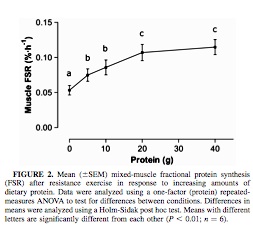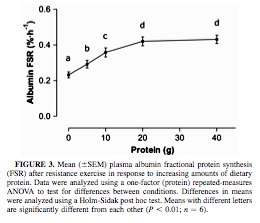For years, bodybuilders have espoused the benefits of consuming tremendous quantities of protein. From as far back as Eugen Sandow consuming a gallon of milk per day, to the 3,000 calorie weight gain shakes of the ’90s, to the modern day claims of top bodybuilders that they eat 500 grams of protein per day, the trend has been to consume ever increasing amounts of protein. Victor Richards, back in the ’90s even claimed to be eating nearly 1,000 grams of protein per day (*he was a liar/ couldn’t count).
Bodybuilding is responsible for this trend, and it’s one of the few areas where we see coaches (real coaches, who coach actual athletes) borrowing from the bodybuilding playbook when they need to increase an athlete’s size; high protein, high calories is the typical prescription. From American Football to Rugby, we see players using bodybuilding-bulking-style eating to gain muscle. Obviously it works…
But does mega loading on protein actually work better than consuming a moderate (sane) amount, or is there a point of diminishing returns? A controversial new-ish study (2008, American Society for Nutrition) seems to indicate that protein synthesis is optimal at 20 grams, post workout – anything more than that, and the synthesis appears to flatline, or increase at a barely minimal amount.
 Before you stop reading, spewing obscenities about how Jay (or Ronnie, or Dorian, or – if you’re really old, Chris Dickerson and Samir Bannout) eats triple that amount at every meal, or whatever, I’ll admit that the study I’m talking about isn’t perfect…but it is very interesting.
Before you stop reading, spewing obscenities about how Jay (or Ronnie, or Dorian, or – if you’re really old, Chris Dickerson and Samir Bannout) eats triple that amount at every meal, or whatever, I’ll admit that the study I’m talking about isn’t perfect…but it is very interesting.
Here’s how it went down: Six healthy young men (22 years old, with prior weight training experience) did 5 leg workouts on 5 separate occasions. After the workout, they drank a shake containing 0, 5, 10, 20, or 40 grams of whole egg protein. After the workout and the shakes, protein synthesis and whole-body leucine oxidation were measured for 4 hours.
Protein synthesis followed a mostly linear dose dependent response curve until intake jumped to 40 grams from 20. At that point, the researchers concluded whole body protein synthesis flatlined. Muscle Protein Synthesis and Albumin Protein Synthesis was maximally stimulated at 20 g. In fact, with regards to most of the markers examined, a protein intake of 20g was just as good as 40g, or slightly (and insignificantly) lower.
 The major difference in blood amino concentration between the groups came at 4 hours later, and was significant, but still not where you’d think it would be when you compare 20 versus 40 grams of protein. Plus, most people would have a protein shake immediately after training, then another meal within 2-3 hours. It’s inconceivable that the minor difference shown at 4 hours would be real-world important.
The major difference in blood amino concentration between the groups came at 4 hours later, and was significant, but still not where you’d think it would be when you compare 20 versus 40 grams of protein. Plus, most people would have a protein shake immediately after training, then another meal within 2-3 hours. It’s inconceivable that the minor difference shown at 4 hours would be real-world important.
The study had considerable limitations: no bodyweight or body surface area was listed for the men, and the number of participants was low. And nobody uses whole egg protein after a workout (nobody that I know). Would whey protein give us a different result curve? Would a blended protein? We don’t know – that was a limitation of the study. In addition, there were certain differences between the 20 and 40 gram groups, although the researchers concluded that they were too small to justify 40g of protein over 20g. And finally, all professional bodybuilders and even top amateurs are using steroids, GH, thyroid hormone, and a bunch of other goodies that will enhance protein synthesis. I suspect that if the participants of this study were geared up, we’d see some different results.
Still, the study is interesting, and perhaps validating for people who just don’t do well on boatloads of protein.
(Am J Clin Nutr 89: 161-168, 2009. First published December 3, 2008; doi:10.3945/ajcn.2008.26401)
